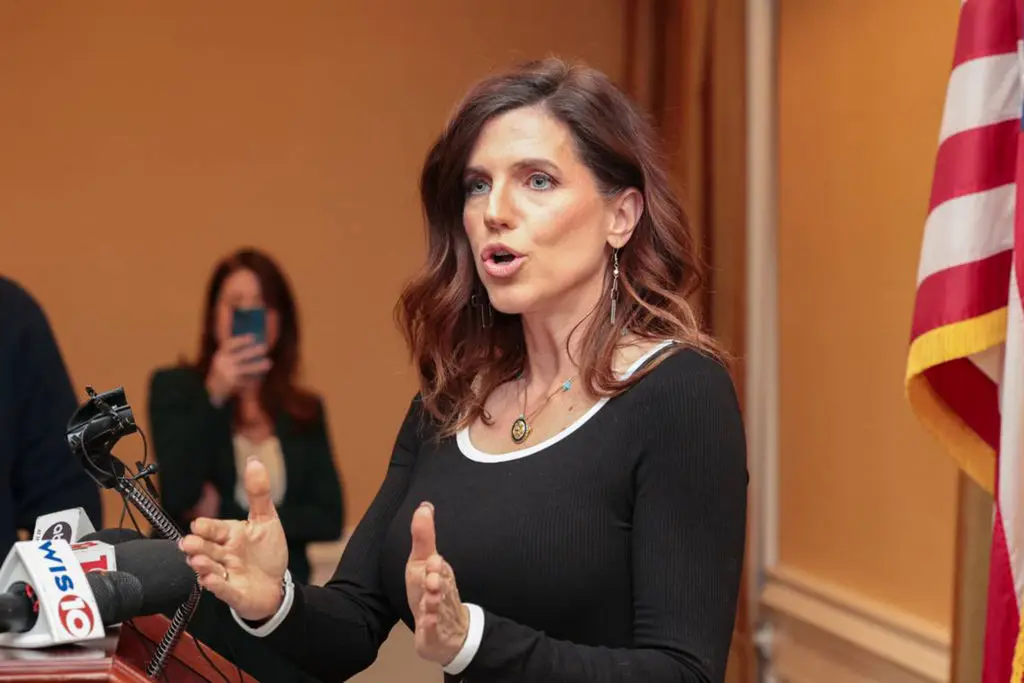In a video that quickly went viral, Rep. Nancy Mace, Republican of South Carolina, was recorded in a tense confrontation with a constituent at a local makeup store. The exchange, filled with expletives and sharp retorts, highlights the increasing polarization of American politics and the challenges faced by elected officials in public interactions. This incident raises questions about the boundaries of acceptable discourse and the role of social media in shaping political narratives.
The confrontation began with a discussion about town hall meetings but quickly escalated into a heated argument touching on topics such as same-sex marriage and political affiliations. Mace’s frustration culminated in her telling the voter to ‘get out of my face,’ a phrase that has since become a focal point of debate. This article delves into the details of the incident, its broader implications, and the reactions from various stakeholders.
The Makeup Store Showdown: Mace vs. Voter
The incident unfolded at a makeup store, a setting that underscores the unexpected nature of the encounter. According to Mace, the voter approached her and began questioning her about the timing of her next town hall. The video, posted by Mace herself, captures the latter part of the exchange, with Mace explaining that she holds town halls every year and that the voter is welcome to attend.
However, the conversation took a turn when Mace mentioned her votes in favor of same-sex marriage. This seemingly triggered a negative reaction from the voter, leading to a more confrontational tone. Mace, visibly frustrated, accused the voter of harassing her, while the voter insisted on a ‘simple question’.
The situation reached a boiling point when Mace exclaimed, ‘You people on the left are absolutely f—ing crazy. Get out of my face.’ This statement, laden with expletives, ignited a firestorm of reactions online and in the media.
‘Some unhinged lunatic, wearing daisy dukes, at a makeup store, got in my face today. Dems are nuts. So I went off – and I won’t be backing down,’ Mace said in a social media post.
The Town Hall Debate: Accessibility and Engagement
At the heart of the confrontation was the issue of town hall meetings. Town halls are a traditional way for elected officials to engage with their constituents, answer questions, and address concerns. However, in recent years, these events have become increasingly fraught with tension, as political polarization has made civil discourse more challenging.
Critics argue that many politicians avoid holding town halls or carefully control the format to minimize the risk of facing tough questions or hostile audiences. Supporters, on the other hand, maintain that town halls are essential for accountability and transparency, providing a platform for ordinary citizens to voice their opinions and hold their representatives accountable.
In Mace’s case, the voter seemed to be questioning the frequency and accessibility of her town hall meetings. While Mace insisted that she holds them every year, the voter appeared skeptical, leading to the escalation of the confrontation.
The Gay Marriage Flashpoint: A Divisive Issue
The mention of Mace’s votes in favor of same-sex marriage added another layer of complexity to the confrontation. While Mace has publicly supported gay marriage, this position may not align with the views of all her constituents, particularly those with more conservative or religious beliefs. The voter’s negative reaction to this revelation suggests that it touched on a sensitive and divisive issue within the community.
The debate over same-sex marriage has been a long and contentious one in American politics, with strong opinions on both sides. While the issue has largely been settled legally, it continues to be a source of tension and disagreement in many communities. Mace’s experience highlights the challenges faced by politicians who attempt to navigate these complex and often conflicting viewpoints.
Polarization and Public Discourse: A Wider Problem
The confrontation between Mace and the voter is symptomatic of a broader problem in American society: the increasing polarization of politics and the decline of civil discourse. As political divisions deepen, it becomes more difficult for people with different viewpoints to engage in constructive dialogue. This can lead to increased frustration, anger, and even violence.
The incident also raises questions about the role of social media in exacerbating these trends. Social media platforms can amplify extreme voices and create echo chambers where people are only exposed to information that confirms their existing beliefs. This can make it even harder to bridge divides and find common ground.
Moving Forward: Finding Common Ground
The confrontation between Nancy Mace and the voter serves as a stark reminder of the challenges facing American politics today. As political divisions deepen and civil discourse declines, it becomes increasingly important to find ways to bridge divides and engage in constructive dialogue. This requires a willingness to listen to opposing viewpoints, respect different perspectives, and find common ground where possible.
While the incident has undoubtedly caused damage to Mace’s reputation, it also presents an opportunity for reflection and learning. By acknowledging the concerns of her constituents and engaging in open and honest dialogue, Mace can begin to rebuild trust and demonstrate her commitment to representing all members of her community. Ultimately, the future of American politics depends on our ability to overcome polarization and work together towards common goals.

Leave a Reply